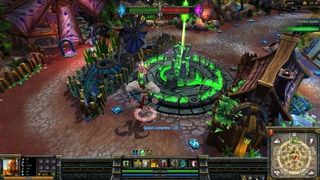Xfire and the free-to-play market: an interview with Xfire president Mark Donovan
PC gaming has changed
PC gaming has gone through a shift in the past few years. While analysts have been predicting its demise at the hands of pirates and consoles, the industry has adapted not by charging more, but by charging less. Now, publishers that scrambled to adapt their business to support console development are rapidly throwing things in reverse, and finding ways to bring their games onto the PC with a free-to-play business model.
The kings of PC gaming are being dethroned by free titles trying to give players the biggest bang for their buck – a trend that Xfire president Mark Donovan has been following closely. We recently had a chat with Donovan about Xfire, PC gaming, and how free-to-play titles are changing everything.

GamesRadar: What trends have you noticed among gamers using Xfire?
Mark Donovan: We've noticed two pretty significant trends and gained a lot of insights over the past couple of years:
Free-to-Play titles are gaining significant momentum in the market. We released a story earlier this year about LoL overtaking WoW as the #1 game on Xfire. This is a significant accomplishment for the F2P model in the western world as it shows just how popular these games are becoming among the mainstream gaming market. We've also seen an increase in the # of F2P titles in the top 30 games on Xfire including games like APB: Reloaded, World of Tanks, Minecraft, etc. We've seen publishers taking note of this trend as well with many changing their business models to F2P (APB, Heroes of Newerth, LOTRO, etc) and even the traditional Pay-to-Play subscription publishers are pushing more and more free trials to compete - including WoW (now free up to level 20) and Starcraft II (which has launched a free starter pack). I think people will be surprised at how fast the model changes for games over the next 5 years.
PvP Arena based titles, especially those based on DoTA like HoN and LoL have seen a large increase in demand and have spawned an entirely new genre (some might call it a sub-genre) of games. I've always loved the challenge and intensity of online play and I think as more and more people get connected to high speed we'll see online games gain more momentum.
GR: Have you noticed gamers’ attitude towards F2P changing? Why?
MD: Very much. There was a perception in the market that F2P titles were lower quality than big budget Western titles and many of the games were produced in Eastern markets and then brought to the West. In the past this was true, but now we're seeing a lot more very high quality titles being converted to the F2P model (like Team Fortress 2, APB, Fallen Earth, Hellgate London, etc) and games being designed from the ground up with this new model in mind. As the quality of the games has gotten better the perception among consumers has definitely evolved. They're not exactly considered on par with AAA titles yet, but I think that given more time they will catch up.

Above: Riot's League of Legends recently dethroned World of Warcraft for top Xfire game.
Sign up to the 12DOVE Newsletter
Weekly digests, tales from the communities you love, and more
GR: What was the first sign of F2P titles gaining a foothold in the US?
MD: I don't think there was any particular sign, but a slow trend. The first big story that made people pay attention to the trend was LoL taking over our #1 spot for minutes played per day
GR: Why do you think the F2P market took longer to gain a foothold in the US when F2P titles have been flourishing in Asia for so long?
MD: The model was created in Asia as a way for publishers to combat piracy. It was an innovative way to ensure that players were contributing the market to make the publishing business viable there, and as we all know, if a business isn't viable it can't survive long. The F2P model was home grown in South Korea and that's where publishers like Nexon and Neowiz emerged. It subsequently spread to China and SE Asia primarily because publishers were being created based on that model. It took a long time to get to the US market for a few reasons:
US publishers have a hard time grasping the F2P model - it's very counter intuitive to executives and investors alike that giving a game you spent millions of dollars making away for free can be even more profitable than charging a one-time fee.
Because the hardest thing for a company to do is change its business model fundamentally. Big US publishers like EA and Activision are being confronted with a lot challenges simultaneously including the change from retail to digital distribution and the rise of the F2P model. It's hard for businesses of that size and experience to shift gears quickly, so we haven't seen a lot of big publishers here adopt the model full force yet.
GR: Are there any publishers who you expect to go even deeper into F2P in the near future?
MD: Yes, EA has already released F2P titles like Battlefield Heroes, id has released Quake Live and Activision has shown that it is experimenting with the model through WoW and SC II so I think it's a foregone conclusion that we'll see them move forward into the market. The question is whether they will be able to build the competence in-house to build games for this market or whether they will wait for new players to establish a beach head here and then look to acquire. The core competencies of Pay-to-Play vs Free-to-Play game publishers are very very different, so anyone who can establish the talents that traditional publishers need will be coveted over the next 5 years.
Hollander Cooper was the Lead Features Editor of 12DOVE between 2011 and 2014. After that lengthy stint managing GR's editorial calendar he moved behind the curtain and into the video game industry itself, working as social media manager for EA and as a communications lead at Riot Games. Hollander is currently stationed at Apple as an organic social lead for the App Store and Apple Arcade.
Most Popular


